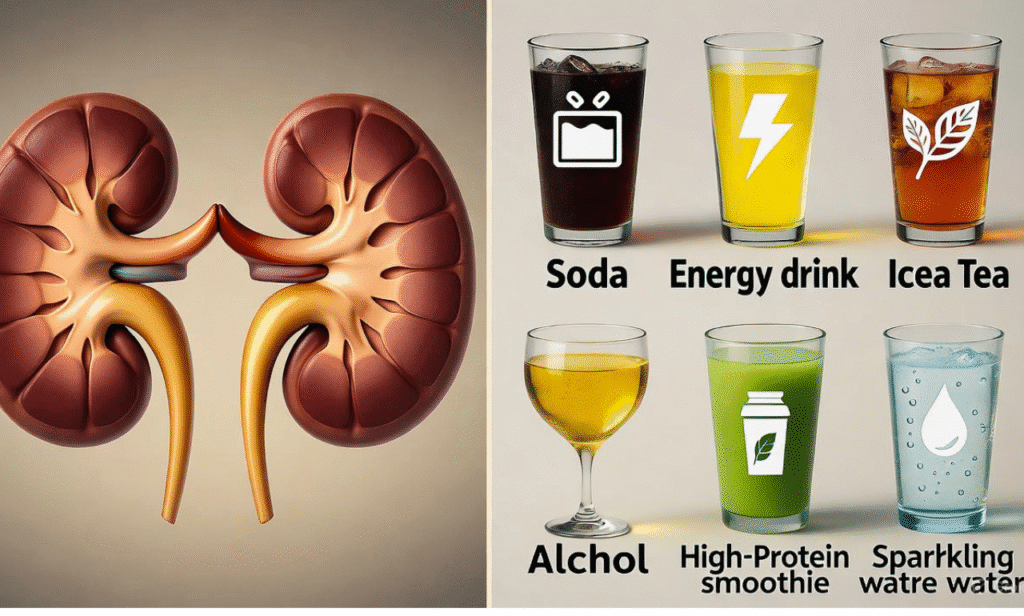
Sipping with Caution: Understanding Your Drinks and Kidney Health
Your kidneys are the unsung heroes of your body, working tirelessly around the clock to filter waste, balance fluids, and regulate blood pressure. We often focus on solid food when considering our health, but what we drink can have an equally powerful impact on these vital organs. Many common beverages contain hidden ingredients that, when consumed excessively, can place a significant strain on your renal system. Becoming mindful of your liquid intake is a profound step toward long-term wellness.
The Sugar-Laden Danger of Sodas
Perhaps the most well-known culprit for potential kidney trouble is sugary soda. The primary issue with these drinks is their staggering high-fructose corn syrup content. When you consume large amounts of fructose, your kidneys have to work harder to filter your blood, and studies have suggested a link between high soda intake and the development of kidney disease. Furthermore, the high phosphorus content in many dark colas can leach calcium from your bones, which may then deposit in the kidneys, potentially leading to painful stones. One study published in the Clinical Journal of the American Society of Nephrology found that participants who drank the highest quantities of soda had a 61% greater risk of developing kidney decline.
Why Energy Drinks Are a Risky Proposition
In our fast-paced world, energy drinks have become a go-to for a quick boost. However, for your kidneys, this “boost” is more of a brutal assault. These beverages are a perfect storm of concerning elements: extreme amounts of caffeine, massive doses of sugar, and a cocktail of artificial additives and stimulants. The caffeine acts as a diuretic, potentially leading to dehydration—a major risk factor for kidney stones. The sheer volume of sugar, as with soda, spikes blood sugar and forces the kidneys into overdrive. Some case studies have even linked excessive energy drink consumption to sudden, acute kidney injury, highlighting their potential for severe, immediate harm.
The Hidden Phosphorus in Artificially Sweetened Iced Teas
Many people switch from soda to bottled iced tea, thinking it’s a healthier choice. While unsweetened home-brewed tea can be beneficial, the commercial versions often tell a different story. They are frequently loaded with added sugars or artificial sweeteners. More surprisingly, some contain added phosphates to enhance flavor and shelf-life. Your body absorbs these added phosphorus much more efficiently than the natural phosphorus found in foods. For individuals with existing kidney issues, this can be particularly dangerous, as healthy kidneys are responsible for removing excess phosphorus from the blood. A buildup can weaken bones and damage blood vessels over time.
The Double-Edged Sword of Alcohol
Enjoying an occasional alcoholic beverage is unlikely to cause kidney damage for a healthy individual. The problem arises with consistent, heavy consumption. Alcohol is a dehydrating substance, which can disrupt the delicate fluid and electrolyte balance your kidneys work to maintain. Chronic heavy drinking also increases your risk of high blood pressure—a leading cause of kidney disease. In severe cases, it can lead to a sudden drop in kidney function known as acute kidney injury. The key, as with many things, is strict moderation to prevent your kidneys from being overworked and damaged.
The Concerning Trend of High-Protein Smoothies
The fitness industry has popularized high-protein shakes and smoothies, but there is a critical caveat for kidney health. Your kidneys are responsible for processing the waste products from protein metabolism, namely urea and nitrogen. When you consume an exceptionally high amount of protein—especially through supplements—you are essentially giving your kidneys a much heavier workload. For those with healthy kidneys, this might not be an immediate issue, but for anyone with pre-existing, undiagnosed kidney impairment, it can accelerate decline. It’s always wise to consult with a doctor or dietitian before significantly increasing your protein intake through supplements.
What Your Kidneys Truly Thirst For
After reviewing these potentially problematic drinks, you might wonder what is left to enjoy. The answer is simple and powerful: water. Pure, clean water is the single best beverage for maintaining optimal kidney function. It helps to flush out toxins, prevents the concentration of minerals that lead to stones, and ensures your blood volume remains sufficient for your kidneys to filter effectively. For a flavor boost without the downsides, consider infusing your water with slices of lemon, cucumber, mint, or berries. Herbal teas are another excellent, caffeine-free option that can be enjoyed hot or iced.
Recognizing the Signs of Kidney Distress
Your kidneys are remarkably resilient and can often sustain damage without showing obvious symptoms until the problem is advanced. This is why proactive care is essential. However, being aware of potential warning signs can prompt you to seek medical advice early. Be mindful of persistent changes in your energy levels, swelling in your ankles or around your eyes, changes in urination patterns (such as frequency, color, or foaminess), and unexplained shortness of breath. If you experience any of these symptoms consistently, it is crucial to schedule a check-up with your healthcare provider.
